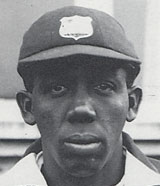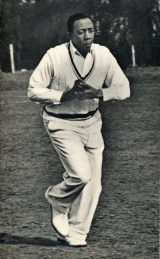Lord and Master
He was the first superstar of West Indies cricket. He bowled furiously, batted aggressively and was an outstanding fielder
|
|

|
He was the first West Indian to play professional cricket in England. He was so popular - he played for Nelson in the Lancashire League for 10 seasons during which time the club won the championship eight times and were runners-up twice - that he was made a Freeman of the Borough of Nelson in 1962. Because of his League engagements he played little more than a hundred first-class matches, in which he scored 4,451 runs at 24.32, and took 424 wickets at 20.60.
Muscular but lithe, stocky but long-armed, he bowled with a bounding run, a high, smooth action and considerable pace. His batting depended heavily on hand-eye coordination and he was murderously innovative on his day. Don Bradman hailed him as the "greatest fieldsman ever seen". This eye-witness account from Neville Cardus gives us a flavour of Constantine as a cricketer. "He does not run after a ball hit through the slips; he springs after it, swoops on it rather than picks it up. There are no bones in his body, only great charges and flows of energy. He can catch anything. Constantine ought to have first refusal of all chances hit to any part of the field.
|
|

|
It came in the summer of 1928 and at Lord's, the home of cricket. Constantine top-scored with 86, the only batsman to score more than 30, as West Indies trailed Middlesex by 122 runs in the first innings. Constantine blasted through Middlesex, grabbing 7 for 57 with a stunning haul of 6 for 11 in his second spell. Chasing 259 West Indies were tottering at 121 for 5 when Connie launched himself into public imagination with a blistering assault. He hit 103 out of 133 with two sixes and 12 fours. One thunderous drive crashed so heavily into Jack Hearne's finger that he did not play again that season. Inside an hour Constantine had pulled off the heist and won the game. His name was etched on the English psyche. Permanently.
As John Arlott wrote, history respects Constantine as a legend who raised the professional cricketer and the coloured West Indian to a level of respect never before accepted in Britain. In 1944 he fought a famous case against colour prejudice when he won damages from The Imperial Hotel in London for failing to receive and lodge him, his wife and daughter. His fellow players, all white-skinned, paid him a rich tribute by choosing him captain of the Dominions team that beat England in the end-of-war game at Lord's in 1946.
He became a much-respected broadcaster post retirement. During the Second World War he was appointed as a Welfare officer for the Ministry of Labour in England. In 1954 he wrote the book Colour Bar and in the same year he gained entrance to the English bar. He returned to Trinidad and became its first High Commissioner in London. In 1964 he resigned over a bus dispute in Bristol and the subsequent falling out, over the issue, with his Prime Minister. However, he stayed in England and became a member of Race Relations Board and sports council and a governor of BBC. He was awarded the MBE in 1945, Knighted in 1962, made an honorary Master of the Bench in 1963, and created a life peer in 1969. Twenty-nine years after his death, the Nelson Leader hailed Constantine as one of Nelson's two men of the millennium. Trinidad posthumously awarded him the Trinity Cross, the country's highest honour.
Sriram Veera is editorial assistant of Cricinfo